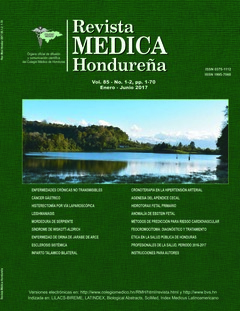Clinical and epidemiological characteristics of Leishmaniasis in the municipality of Trojes, El Paraíso, 2014-2017
Keywords:
Leishmaniasis, Rural Population, Parasitic Diseases, Leishmania, HondurasAbstract
Background. Parasitic diseases are universally distributed and cause significant morbidity and mortality, especially in tropical regions of the world, associated with a low degree of development, poor hygienic-sanitary conditions, and certain ecological conditions. Objective. To describe the clinical and epidemiological characteristics of Leishmaniasis in the municipality of Trojes, El Paraíso, Honduras, period 2014-2017. Methodology. Descriptive cross-sectional study. Of the 45,393 patients seen, 388 presented Leishmaniasis (0.8%). Sample size was estimated of 204 (52.6%, 95% CI). Variables included sociodemographic, epidemiological, clinical, laboratorial, diagnostic and treatment characteristics. The information collected was entered in Epiinfo database version 7.1.5 (CDC, Atlanta). Results are presented as frequencies, percentages, ranges and averages. The personal information of the cases was handled confidentially. Results. The most frequent type of leishmaniasis was the cutaneous form in 89.1% (188), the most affected age group was the young adult (20-39 years old) 37.8% (77), the latter being male 61.8% (126). The anatomic zone most affected were the upper limbs 43.6% (89), the lesion size was between 2-10cm 64.2% (131). 96.1% (196) remained in forested areas.74.5% (152) showed no symptoms. Meglumine Antimonate (Glucantime) was used in 100% (204) of the patients. The tools for prevention and control of this parasitosis are limited, so it is important for people exposed to participate in actions in order to reduce contact between humans and vectors. Early and timely diagnosis as well as adequate treatment are crucial to improve the patient’s quality of life.
Downloads
430




